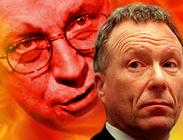Fitzgerald's impassioned presentation to the jury Tuesday suggests that he strongly believes Cheney instructed Libby to leak Plame's identity to Miller in July 2003.
"If you think that the vice president and the defendant 'Scooter' Libby weren't talking about [Plame] during the week where the vice president writes that [Plame] sent [Wilson] on a junket, in [Wilson's] July 6 column, the vice president moves the number one talking point, 'not clear who authorized [Wilson's Niger trip], if you think that's a coincidence, well, that makes no sense," Fitzgerald told jurors.
Fitzgerald squarely blames Libby for putting the cloud on the Vice President. Another quote from his closing:
He's put the doubt into whatever happened that week, whatever is going on between the Vice President and the defendant, that cloud was there. That's not something that we put there. That cloud is something that we just can't pretend isn't there.
Fitzgerald reminded the jury of Cheney's actions in cutting out the Wilson op-ed and putting handwritten notes on it.
The Vice President cuts out the article, the guy he works for. That's important. The Vice President makes the note about the wife. That's important. Government Exhibit 412, he makes the note, the Maureen Dowd column. That's important.
Fitz puts Cheney and Libby's actions together in this comment:
Let's assume the best-case scenario, the Vice President asked the question, not Mr. Libby, since he did most of the talking. This is a fingerprint that says on July 14th, the Vice President has read the Novak column. The other exhibit shows you, around July 14th, the defendant read the Novak column. And this is a fingerprint that says the brains of the Vice President and defendant Libby are wrapped around the Novak column on July 14th.
So, what happens to Cheney now? I think the answer if Libby is acquitted is likely nothing. But, what if Libby is convicted? If Libby has been promised a pardon, it's unlikely he'd take a deal with Fitz. But, maybe Fitz will feel emoldened by a conviction of Libby regardless of whether he can get Libby's testimony. I wonder if Fitz has other immunized testimony -- from those who didn't testify at Libby's trial that he could use against Cheney. If he immunized others who didn't testify at Libby's trial, we wouldn't know about it.
The mainstream media seems to think Fitzgerald is done. I'm not sure he isn't holding something in his back pocket against our Vice President.
Update: As to whether a sitting vice-president can be indicted, I think the answer is yes. Here's the Office of Legal Counsel 2000 Memo to Attorney General which takes that position after analyzing the Solicitor General's 1973 brief that discussed the issue in the context of Spiro Agnew.
On October 5, 1973, less than two weeks after OLC issued its memorandum, Solicitor General Robert Bork filed a brief in the United States District Court for the District of Maryland that addressed the question whether it would be constitutional to indict or criminally try a sitting President. Then-Vice President Agnew had moved to enjoin, principally on constitutional grounds, grand jury proceeding against him. See SG Brief at 3. In response to this motion, Solicitor General Bork provided the court with a brief that set forth "considerations based upon the Constitution's text, history, and rationale which indicate that all civil officers of the United States other than the President are amenable to the federal criminal process either before or after the conclusion of impeachment proceedings."
....In explaining why, as an initial matter, the Vice President could be indicted and tried while still in office, the brief argued that indictment would not effect the de facto removal of that officer. SG Brief at 11.
"[I]t is clear from history that a criminal indictment, or even trial and conviction, does not, standing alone, effect the removal of an impeachable federal officer." Id. at 11-12. The brief noted the past constitutional practice of indicting and even convicting federal judges during their tenure, as well as the fact that Vice President Aaron Burr "was subject to simultaneous indictment in two states while in office, yet he continued to exercise his constitutional responsibilities until the expiration of his term." Id. at 12.
....The brief therefore determined that "[c]ertainly it is clear that criminal indictment, trial, and even conviction of a Vice President would not, ipso facto, cause his removal; subjection of a Vice President to the criminal process therefore does not violate the exclusivity of the impeachment power as the means of his removal from office." Id. at 13.





